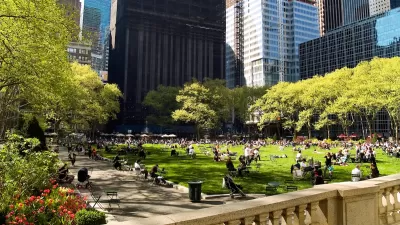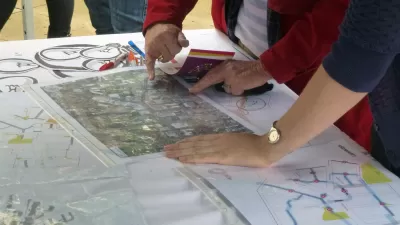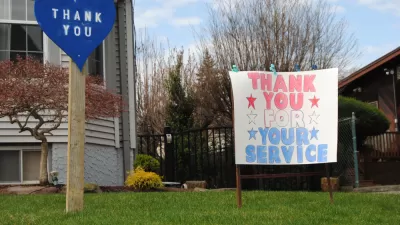A bit of a redefining moment is happening among European planners as they look for ways to address the growing complexity of their communities and the world.
"Call it post-planning, planning 2.0, or maybe un-planning. And the crazy thing is, this revolt against traditional approaches to planning is being conducted by planners themselves," writes Anthony Flint to introduce a recent article about the "identity crisis" in contemporary planning.
Flint's discussion of the evolution of planning follows his attendance of the annual Association of European Schools of Planning conference, where "there was no little soul-searching about the practice of the craft." Rather, Flint writes, planners there were wondering whether, "despite the grand efforts, planning wasn’t really paying off."
As for why: "Global urbanization carries multiple complexities, with loads of unintended consequences and unanticipated outcomes, whether in Cleveland or London or Bogota. If the future is not linear, planning in a linear fashion is the equivalent of banging one’s head against the drafting table."
The article focuses on the exchange of ideas between European planning and American planning, which, already complicated by American political concerns about socialism and Agenda 21 fear mongering, could now be further complicated by European rejection of Smart Growth and other ideas exported by continental planers. According to Flint, "smart growth, whether urban growth boundaries or compact transit-oriented development, is essentially European. And now the Europeans are saying the command-and-control approach doesn’t work so well. European nations are actually adopting more of an American stance—a decentralized agenda, pushing down remaining responsibilities to local jurisdictions, and counting on local planners to engage the citizenry much more."
The article goes on to describe a future for planning, advocated by attendees at the event, that will allow for complexity and evolution in a more complex and connected world.
FULL STORY: Is Urban Planning Having an Identity Crisis?

Study: Maui’s Plan to Convert Vacation Rentals to Long-Term Housing Could Cause Nearly $1 Billion Economic Loss
The plan would reduce visitor accommodation by 25,% resulting in 1,900 jobs lost.

North Texas Transit Leaders Tout Benefits of TOD for Growing Region
At a summit focused on transit-oriented development, policymakers discussed how North Texas’ expanded light rail system can serve as a tool for economic growth.

Using Old Oil and Gas Wells for Green Energy Storage
Penn State researchers have found that repurposing abandoned oil and gas wells for geothermal-assisted compressed-air energy storage can boost efficiency, reduce environmental risks, and support clean energy and job transitions.

Private Donations Propel Early Restoration of Palisades Playground
Los Angeles has secured over $1.3 million in private funding to restore the Pacific Palisades playground months ahead of schedule, creating a modern, accessible space that supports community healing after recent wildfires.

From Blight to Benefit: Early Results From California’s Equitable Cleanup Program
The Equitable Community Revitalization Grant (ECRG) program is reshaping brownfield redevelopment by prioritizing projects in low-income and environmental justice communities, emphasizing equity, transparency, and community benefits.

Planting Relief: Tackling Las Vegas Heat One Tree at a Time
Nevada Plants, a Las Vegas-based nonprofit, is combating the city’s extreme urban heat by giving away trees to residents in underserved neighborhoods, promoting shade, sustainability, and community health.
Urban Design for Planners 1: Software Tools
This six-course series explores essential urban design concepts using open source software and equips planners with the tools they need to participate fully in the urban design process.
Planning for Universal Design
Learn the tools for implementing Universal Design in planning regulations.
Ascent Environmental
Borough of Carlisle
Institute for Housing and Urban Development Studies (IHS)
City of Grandview
Harvard GSD Executive Education
Toledo-Lucas County Plan Commissions
Salt Lake City
NYU Wagner Graduate School of Public Service





























